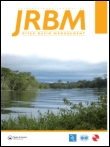
INTERNATIONAL JOURNAL OF RIVER BASIN MANAGEMENT
Scope & Guideline
Innovating strategies for effective river basin governance.
Introduction
Aims and Scopes
- Hydrological Modeling and Analysis:
Research that employs various hydrological models to simulate and predict water flow, sediment transport, and water quality in river basins. - Geospatial Technology Applications:
Utilization of Geographic Information Systems (GIS) and remote sensing technologies for mapping, monitoring, and analyzing river basin characteristics and changes. - Environmental Impact Assessments:
Studies focused on evaluating the ecological and environmental impacts of human activities, such as land use changes, dam constructions, and pollution in river basins. - Socioeconomic Studies and Policy Analysis:
Research that examines the social and economic dimensions of river basin management, including community engagement, governance, and sustainability practices. - Climate Change Impacts:
Investigations into how climate change affects hydrological cycles, water resources, and ecosystem services within river basins. - Flood and Drought Risk Management:
Research addressing strategies and methodologies for managing flood and drought risks, including modeling, assessments, and policy frameworks.
Trending and Emerging
- Integrated Water Resource Management (IWRM):
There is a significant increase in research focused on IWRM approaches that consider the interconnectedness of water, land, and ecosystems in managing river basins. - Climate Change Adaptation Strategies:
Emerging studies are increasingly addressing how river basins can adapt to the impacts of climate change, focusing on resilience-building and sustainable practices. - Public Participation and Governance:
Research exploring the role of community involvement and governance structures in river basin management is on the rise, indicating a shift towards more inclusive management practices. - Water Quality and Pollution Control:
There is a growing emphasis on assessing and improving water quality, with studies focusing on pollution sources, mitigation strategies, and health risk assessments. - Ecosystem Services Valuation:
Emerging research is focusing on the valuation of ecosystem services provided by river basins, highlighting their importance for sustainable management and policy-making.
Declining or Waning
- Traditional Hydraulic Engineering:
There is a noticeable decrease in the focus on conventional hydraulic engineering methods, as the journal shifts towards more integrated and interdisciplinary approaches to river basin management. - Single-Factor Studies:
Research that solely examines one aspect of river basin management, such as only hydrology or only ecology, is becoming less common as the emphasis on integrated studies grows. - Historical Case Studies:
While historical analyses still hold value, there is a waning interest in purely historical case studies without contemporary relevance or application to current river management issues.
Similar Journals

LIMNETICA
Championing high-quality research in limnology.LIMNETICA is a prestigious academic journal dedicated to advancing the field of Aquatic Science, Ecology, and Water Science and Technology. Published by the Asociación Española de Limnología in Spain, this journal serves as a vital platform for researchers and professionals seeking to share their findings and insights from 1996 to 2024. With a commendable Q2 ranking in Ecology and notable Q3 rankings in Aquatic Science and Water Science and Technology, LIMNETICA emphasizes high-quality, peer-reviewed research that contributes to our understanding of freshwater ecosystems. Although currently not classified under Open Access, its rigorous indexing and Scopus rankings—positioning it in the top 64th percentile for Environmental Science—illustrate its impact in the scientific community. Researchers, students, and professionals are encouraged to engage with LIMNETICA to stay abreast of key developments and foster collaborative efforts in aquatic research.
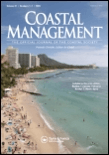
COASTAL MANAGEMENT
Advancing sustainable solutions for coastal ecosystems.COASTAL MANAGEMENT is a distinguished journal published by Taylor & Francis Inc, specializing in the interdisciplinary field of environmental science with a focus on coastal ecosystems. Since its inception in 1987, this journal has provided a critical platform for researchers and practitioners to disseminate innovative studies and practical solutions related to coastal management challenges. With an impressive Q2 ranking in both Environmental Chemistry and Environmental Science categories, it is recognized for its significant contributions to the field, evidenced by its Scopus ranking of #61/233 in General Environmental Science and #60/147 in Environmental Chemistry. Although open access options are not available, the journal maintains a broad readership within the academic community through its comprehensive exploration of coastal issues. With a commitment to advancing knowledge and fostering collaboration among experts, COASTAL MANAGEMENT plays a pivotal role in shaping sustainable practices and policies essential for the conservation and stewardship of our vital coastal environments.

Journal of Integrative Environmental Sciences
Shaping the future of environmental science and public health.Journal of Integrative Environmental Sciences, published by Taylor & Francis Ltd, stands as a pivotal platform for researchers and professionals in the fields of Environmental Science and Public Health. With an impact factor reflecting its significance in the academic community, this Open Access journal has been democratizing access to cutting-edge research since 2016, enhancing visibility and dissemination of vital insights. The journal covers a wide scope, converging studies from 2010 to 2024, and holds esteemed rankings in Q2 quartiles for Environmental Science and Public Health, indicating its substantial contribution to these critical fields. With Scopus rankings placing it favorably among its peers, researchers benefit from a diverse array of articles addressing pressing environmental and health issues, sustainability, and renewable energy. As an essential resource for advancing knowledge and fostering innovation, the Journal of Integrative Environmental Sciences encourages contributions that span interdisciplinary approaches to solving some of the most challenging environmental dilemmas of our time.

Asian Journal of Water Environment and Pollution
Exploring innovative pathways to cleaner water.Asian Journal of Water Environment and Pollution is a leading academic journal published by IOS PRESS, dedicated to advancing the field of water science and technology, as well as pollution management. With its ISSN 0972-9860 and E-ISSN 1875-8568, this journal serves as a pivotal platform for researchers, professionals, and academics alike who are keen to explore innovative solutions and interdisciplinary approaches toward water-related challenges and environmental issues. Although currently positioned in the Q4 category for both pollution and water science & technology, the journal aims to foster impactful research and discussions that can enhance the understanding and treatment of water pollution. The Asian Journal of Water Environment and Pollution not only plays a crucial role in disseminating knowledge but also encourages the sharing of findings from unique geographic perspectives, particularly from Asia. As the field evolves, this journal is poised to become a vital resource for those looking to contribute to sustainable water management practices and pollution reduction strategies.
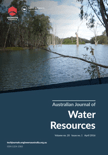
Australasian Journal of Water Resources
Elevating the Discourse on Water SustainabilityThe Australasian Journal of Water Resources, published by Taylor & Francis AS, stands as a pivotal resource in the field of water science and technology. With an ISSN of 1324-1583 and E-ISSN 2204-227X, this esteemed journal facilitates the dissemination of high-quality research articles that address critical issues facing water resources management across Australasia and beyond. Ranking in the Q2 category for Water Science and Technology as per the 2023 metrics, it boasts an impressive Scopus ranking of 75/261 in Environmental Science, placing it in the 71st percentile for its field. Spanning from 2008 to 2024, the journal emphasizes the importance of sustainable water practices, innovative technologies, and environmental policy, making it an invaluable asset for researchers, professionals, and students seeking to advance their knowledge and contribute to the discourse on water management challenges. The journal's rigorous peer-review process and commitment to open academic dialogue ensure that emerging trends and pioneering ideas receive the attention they deserve.
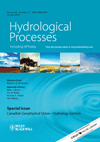
HYDROLOGICAL PROCESSES
Exploring the Dynamics of Water ScienceHYDROLOGICAL PROCESSES, published by WILEY, stands as a leading journal in the realm of Water Science and Technology. With an impressive impact factor and a prestigious ranking of Q1 in its category, the journal has carved a niche for itself since its inception in 1986, continuing to disseminate insightful research through to 2024. It boasts a solid Scopus ranking, sitting at #59 out of 261 in the Environmental Science field, placing it in the 77th percentile and emphasizing its relevance in the study of hydrological dynamics. Although not an open access journal, it provides essential and impactful articles that contribute to understanding hydrological phenomena, ensuring broad accessibility through libraries and institutional subscriptions. Researchers, professionals, and students alike will find HYDROLOGICAL PROCESSES a vital resource for the latest studies and advancements in water resource management and environmental sustainability.

Journal of Hydrology-Regional Studies
Empowering research to transform hydrological practices.Journal of Hydrology-Regional Studies, published by ELSEVIER in the Netherlands, stands as a leading open-access platform since 2014 for disseminating high-quality research in the fields of hydrology and water management. With an impressive impact factor and recognition as a Q1 journal in both Earth and Planetary Sciences and Water Science and Technology categories, it emphasizes regional studies that advance understanding of hydrological processes and their implications for sustainable management practices. The journal has established a significant global reach, evident from its Scopus rankings, which place it in the top percentiles within its disciplines, fostering a dynamic exchange of ideas among researchers, professionals, and students alike. By mobilizing critical insights and innovative solutions in hydrology, this journal aims to contribute to solving the pressing water-related challenges faced by our society.
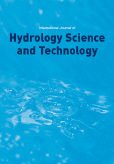
International Journal of Hydrology Science and Technology
Pioneering Research at the Intersection of Hydrology and TechnologyThe International Journal of Hydrology Science and Technology, published by InderScience Enterprises Ltd, is a distinguished platform dedicated to advancing knowledge in the field of hydrology, environmental engineering, and water science. With an ISSN of 2042-7808 and an E-ISSN of 2042-7816, this journal, established in 2011 and continuing through 2024, serves as an essential resource for researchers, professionals, and students alike. Despite being categorized in the Q3 quartile across multiple disciplines including Earth and Planetary Sciences, Environmental Engineering, Waste Management and Disposal, and Water Science and Technology, the journal maintains a reputation for contributing significant findings that impact both theory and practical applications in addressing hydrological challenges. Currently unavailable through Open Access options, the journal remains committed to disseminating valuable research that informs sustainable practices in water resource management. The editorial team encourages submissions that explore innovative strategies and methodologies while fostering interdisciplinary discussions, making this journal a pivotal player in shaping the future of hydrological science.

Earth Systems and Environment
Innovating Solutions for Earth’s Environmental ChallengesEarth Systems and Environment, published by Springer International Publishing AG, is a leading peer-reviewed journal dedicated to the multidisciplinary study of natural and anthropogenic processes that shape the Earth's systems. With an impressive impact factor and consistently ranked in the Q1 category across various fields, including Computers in Earth Sciences, Economic Geology, and Environmental Science, it stands as a premier platform for researchers and professionals seeking to address pressing environmental challenges. The journal covers a wide spectrum of topics, from geology to global change, and emphasizes innovative methodologies and interdisciplinary approaches to understand and manage Earth systems. As an essential resource for scholars and practitioners, Earth Systems and Environment commits to excellence and facilitates open dialogue on critical issues affecting our planet.
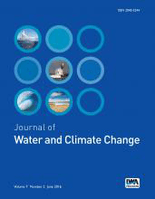
Journal of Water and Climate Change
Championing Interdisciplinary Research for a Water-Secure FutureJournal of Water and Climate Change is a premier open-access journal published by IWA Publishing, dedicated to advancing the understanding of the interplay between water resources and climate change. With an ISSN of 2040-2244 and an E-ISSN of 2408-9354, this journal has established itself as a crucial platform for interdisciplinary research, publishing high-quality articles that address the challenges posed by climate variability on water systems globally. Since achieving open access status in 2021, the journal has fostered wider dissemination of knowledge among its audience, featuring works that span pivotal topics in Atmospheric Science, Global and Planetary Change, and Water Management. Notably ranked within the top quartiles in several relevant categories as of 2023, it occupies a vital position in the academic community, offering insights that are essential for policymakers, environmental scientists, and researchers striving to create sustainable solutions for water and climate challenges. Its commitment to excellence is reflected in its strong Scopus rankings, standing at the 66th percentile in Water Science and Technology and 65th percentile in Management, Monitoring, Policy, and Law. Located in the United Kingdom, this journal not only serves as a repository of cutting-edge research from 2010 to 2024 but also engages a diverse readership passionate about promoting sustainable water management practices.